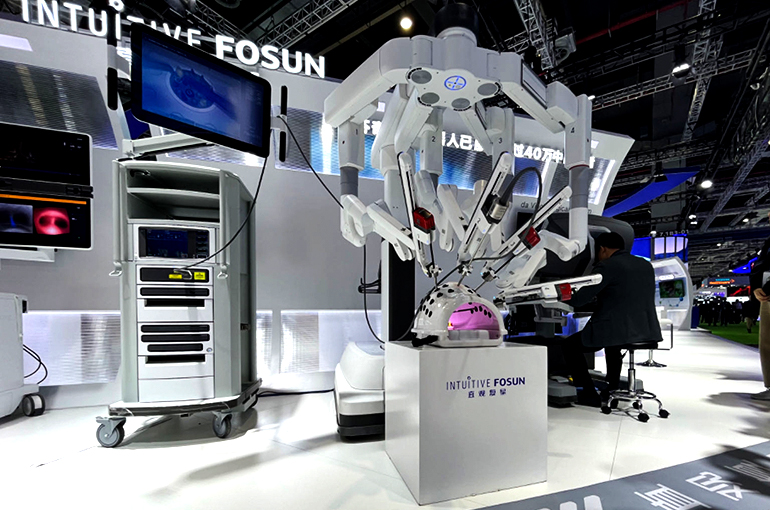 CIIE Helps Foreign Drug, Medical Apparatus Makers Fast Track Access to China Market
CIIE Helps Foreign Drug, Medical Apparatus Makers Fast Track Access to China Market(Yicai) Nov. 10 -- The China International Import Expo serves as a fast pass for overseas drug and medical device producers to enter China, and as a result it proves a big draw to many such firms each year who are keen to introduce their wares to Chinese consumers.
It usually takes two to three years for foreign makers of radiotherapy apparatus to close their first deal in China, but participating in the CIIE halves this time frame, Gong Anming, global executive vice president and president China of Swedish radiation therapy equipment maker Elekta, told Yicai.
“The CIIE enables us to introduce our products to industry leaders and helps cut the time needed to negotiate deals with hospitals,” Gong said.
Elekta, which has taken part in all six expos, bagged an order from a brain hospital in Shanghai on the first day of the trade fair this year for a new device that it brought to the show. And a product the Stockhom-based company debuted at the first expo five years ago now has 15 users in the country.
It took only a year for the world’s smallest heart pacemaker, showcased by Medtronic at the first CIIE, to appear on the Chinese market, about half the usual time, said Gu Yushao, global senior vice president and president of the US medical device giant’s China arm.
The CIIE is the best platform for cutting-edge products to enter China and an “accelerator” for samples to get on the shelves in the country, Gu said. Minnesota-based Medtronic has exhibited more than 300 innovative products and debuted over 50 devices at the six expos.
Boehringer-Ingelheim premiered eight innovative drugs and solutions for use on human beings and animals at the expo this year, four of which are at the clinical trial stage. Since the German drugmaker first attended the expo in 2019, it has introduced nearly 30 innovative products and solutions, many of which have since been approved to go to market in China.
“This is thanks to our ‘China Key’ strategy proceeding smoothly,” Pavol Dobrocky, president and chief executive of Boehringer-Ingelheim China, told Yicai. The Ingelheim-am-Rhein-based firm included China in its global project of early-stage development of innovative drugs in 2019 to enable these drugs to go into the market in China and the rest of the world simultaneously.
Localized Production
Varian Medical Systems’ plant in Beijing is one of the firm’s main production, research and development bases, said Zhang Xiao, global senior vice president and president of the US radiation oncology device maker’s China arm. Around 83 percent of products made by the facility are exported to 76 countries and about 10 million people with cancer in the world have benefited from Varian’s China-made products.
China is a huge open market. Elekta produces over 70 percent of its medical apparatus in China, up from 20 percent six years ago, said Gong.
AstraZeneca penned a series of agreements with the governments of eastern Jiangsu and Shandong provinces on the first day of the fair, which include building new plants in three cities. It also announced that it will set up a global R&D center in Hong Kong. The Cambridge-based firm has established more than 180 R&D projects in China since it announced the first one at the 2019 expo.
AstraZeneca has repeatedly hiked investment in China because it is optimistic about long-term development opportunities in the country as there is huge room to grow in the market, said Liu Qian, vice president and head of the omni-channel business unit at AstraZeneca China.
Editors: Tang Shihua, Kim Taylor